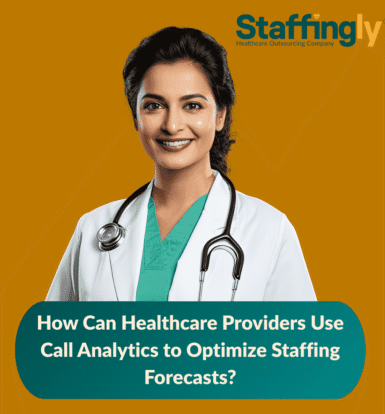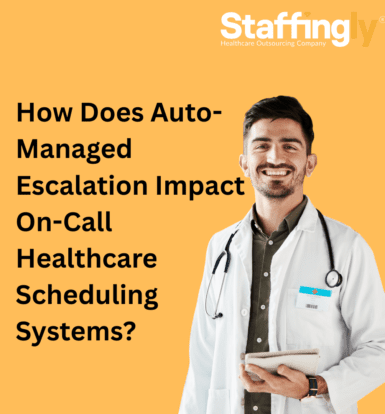On-Demand Outsourcing BPO Services for Healthcare Providers With 24/7 Coverage!
Save up to 70% on staffing costs!
Browse Specialty Staffing Services
How Can Healthcare Providers Use Call Analytics to Optimize Staffing Forecasts?
In the fast-evolving U.S. healthcare landscape, optimizing staffing in hospitals and clinics is critical for delivering high-quality patient care while managing costs. Call analytics, powered by AI and real-time data, revolutionizes staffing forecasts by predicting call volumes, reducing wait times, and improving patient satisfaction. By integrating solutions like Staffingly’s healthcare outsourcing services, providers can achieve up to 66% cost reductions, 96% patient satisfaction, and hold times under 10 seconds. This guide, tailored for U.S. healthcare providers and patients, explores how

How to Enhance After-Hours Patient Care with Faster Call Response in Healthcare?
In the U.S. healthcare system, delivering exceptional after-hours patient care is crucial for improving outcomes, boosting patient satisfaction, and optimizing operational efficiency. With only 29% of U.S. physicians offering structured after-hours care beyond emergency department referrals, healthcare providers and patients face significant challenges in accessing timely support. By integrating advanced communication technologies, best practices, and Staffingly’s specialized outsourcing solutions, healthcare organizations can transform after-hours care. This blog, tailored for U.S. healthcare providers and patients, highlights how to enhance call response

How Does Auto-Managed Escalation Impact On-Call Healthcare Scheduling Systems?
In the high-pressure environment of U.S. hospitals and clinics, ensuring rapid responses to patient needs is paramount. Auto-managed escalation in on-call scheduling systems has become a critical tool to ensure healthcare providers are promptly alerted and can respond effectively to emergencies. This article explores the impact of auto-managed escalation, its benefits, and how Staffingly enhances its implementation to improve healthcare delivery. Key Benefits: The adoption of auto-managed escalation provides significant advantages in healthcare settings: Faster Response Times: Automated escalation ensures

What Benefits Do Healthcare Answering Services Offer for Coordinating Return to Office Notices?
As healthcare facilities transition back to in-office operations, effective communication with patients and staff is paramount. Healthcare answering services offer a robust solution to manage return-to-office notices, addressing the unique challenges faced by healthcare providers. By leveraging these services, practices can enhance efficiency, ensure compliance, and improve patient satisfaction. This article outlines the key benefits of healthcare answering services, with a focus on how Staffingly supports healthcare providers during this critical phase. Key Takeaways Healthcare answering services are essential for

How Can Smarter Call Routing Improve Patient Access in Hospitals and Clinics?
In today’s fast-paced healthcare environment, patient access is a cornerstone of effective care delivery. With increasing demand on hospitals and clinics, providing seamless access to the right healthcare provider from the very first call has become crucial. Smarter call routing technologies are increasingly recognized for their ability to streamline this process, reduce patient wait times, and improve both patient satisfaction and operational efficiency. In this article, we explore how smarter call routing systems can transform patient access and support better

How Empathy-Trained Agents in Hospitals Enhance Healthcare Contentment Under HIPAA ?
In the US healthcare system, patient satisfaction is a cornerstone of quality care, driving HCAHPS (Hospital Consumer Assessment of Healthcare Providers and Systems) scores and fostering patient loyalty. Empathy-trained agents both human staff and AI-assisted systems trained in compassionate communication are transforming patient experience in hospitals and clinics. By blending empathy training with strict HIPAA compliance, these agents enhance healthcare contentment, reduce stress, and build patient trust. Staffingly, a leading healthcare staffing provider, plays a critical role by recruiting and

Can Outsourcing Help Doctors Stay HIPAA Compliant With Less Stress?
Healthcare professionals today balance the demands of patient care with the burden of administrative compliance. One of the most stressful responsibilities for physicians and staff is maintaining HIPAA compliance. Failure to comply can lead to severe penalties, data breaches, and reputational harm. For many practices, outsourcing HIPAA-related responsibilities provides a practical solution—helping doctors reduce stress, ensure compliance, and focus on delivering exceptional patient care. Understanding HIPAA Compliance Outsourcing HIPAA compliance outsourcing involves engaging external experts or specialized staff to manage

How Can HIPAA-Secure Messaging Improve Communication in Hospitals?
In the fast-paced healthcare environment, effective communication is the backbone of safe patient care and smooth hospital operations. With rising demands, traditional communication methods such as pagers, unsecured texts, or phone calls often create delays and risks. HIPAA-secure messaging has emerged as a modern solution, providing hospitals with a reliable, compliant, and efficient way to exchange patient information. This technology is not only transforming hospital communication but also enhancing patient outcomes, staff efficiency, and overall organizational performance. Understanding HIPAA-Secure Messaging
 Book a Demo to Build Your Team Today!
Book a Demo to Build Your Team Today!


 Read Case Studies
Read Case Studies 



 Virtual Medical Assistants
Virtual Medical Assistants



